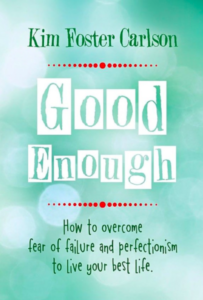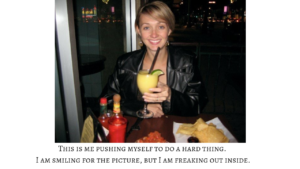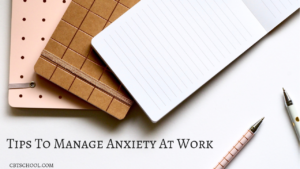Managing Perfectionism and Learning To Be Good Enough (with Kim Foster Carlson)
 Welcome to another episode of Your Anxiety Toolkit Podcast! This week, we talk about all things anxiety and mental health.
Welcome to another episode of Your Anxiety Toolkit Podcast! This week, we talk about all things anxiety and mental health.
Today, I am excited to share with you our guest, Kim Foster Carlson. Kim Foster Carlson is an award-winning broadcast journalist in San Francisco Bay and the author of the book Good Enough: How to Overcome Fear of Failure and Perfectionism To Live Your Best Life.
There is not a day in my office where I don’t see the debilitating anxiety that is caused by perfectionism. Perfectionism can prevent us from trying new things, paralyze us when we have to perform, and can cause us to be very hard on ourselves. In today’s podcast, Kim addressed many of the factors that might cause perfectionism, as well as some super helpful tools to manage it. The difficult part is that we are constantly being bombarded by unrealistic expectations from our family, our social media accounts, from magazines and from our society’s expectations.
In this interview, Kim and I talk about perfectionism, fear of failure, anxiety and procrastination.
Kim shares her history of being an athlete and how perfectionism and the fear of failure caused her to be very hard on herself.
Kim also shares her story of going to therapy and realizing that perfectionism was the cause of her anger, anxiety and poor coping strategies. She shared how this was triggered by stressors related to parenting and she was so open about how she got through some very difficult times. Kim details many mindfulness skills that helped her along the road to becoming a “recovered perfectionist.”
One tip that I loved from today’s episode of Your Anxiety Toolkit was Kim’s example of Steph Curry, a professional basketball player. Kim emphasized the importance of “finding the joy” (Steph Curry’s phrase) in everything we do by practicing gratitude and by verbally thanking someone every day. I just loved this idea and this is a tool I am going to adopt myself.
I hope you enjoy this week’s episode.
This is me...doing a hard thing

Hello there lovely CBT School Community,
You all know how much I adore coming on here every week and sharing cool Cognitive Behavioral Therapy (CBT) tips or fun Mindfulness tools with you all!? As I often say, “these are skills for life” and sometimes we have to stare the dark place of mental illness in the face before we get introduced (and practice) these wonderful tools. Sometimes, we have to hit rock bottom before we ask for help. We have to be struggling so much that we have no choice but to double down and learn the tools we need to live a more mindful and healthy life.
This was definitely the case for me. In today’s episode of Your Anxiety Toolkit podcast, I share with you my story with Mental Illness.
I am not going to lie. I have felt many emotions about sharing my own story. This week’s episode is one that has challenged me to be as brave as I can be.
I have been thinking about telling my own story of mental illness/health for some time and it has taken me many conversations with trusted colleagues and family members to come to a place where I felt ready. So, today, I bravely share with you my story. This is me….doing a hard thing.
In the episode, I talk about how I moved away from my small hometown to go to university. Immediately, I was riddled with anxiety and panic. I felt so painfully alone and I was plagued with the repetitive thought that “something bad will happen.” I felt out of control and I had no tools to manage these terrifying feelings. In this episode, I share how I responded to these thoughts in the only way I knew how. I used what some would consider very positive behaviors and use them in a way that became very problematic. Before too long, I was restricting my food, compulsively exercising and binge-eating to manage my emotions. I spent hours planning and calculating my calorie intake and I kept it all a secret, in fear that someone would find out how much I was struggling. I was so afraid of being seen as weak or over-dramatic. These behaviors stripped me of my joy, comfort and my life.
My hope with sharing my own personal story is to remind you that you can get better. I also hope that it helps us all feel more connected and a part of the same community. We all have our own story and struggles, and I wanted to share mine with you so you felt I understood what you might be going through. While I might not have exactly the same story (or circumstances), we all get to the place where we have to ask for help. We all get to the place where were feel so out of control that we have to make a change. That was me. And this is me….doing a hard thing.
I hope you find it helpful, or comforting. Please know that you can get better and you can get your life back.
Dr. David Burns Helps Us Learn the Art of Feeling Good
Hello! My name is Kimberley Quinlan and welcome back to Your Anxiety Toolkit Podcast.
 For those of you who are new, welcome! Your Anxiety Toolkit is brought to you by CBTschool.com. CBTschool.com is an online resource that provides evidence-based tools and resources for those who are experiencing anxiety, depression, or other mental health struggles. CBT is an acronym for Cognitive Behavioral Therapy. CBT is made up of Cognitive Therapy and Behavioral Therapy.
For those of you who are new, welcome! Your Anxiety Toolkit is brought to you by CBTschool.com. CBTschool.com is an online resource that provides evidence-based tools and resources for those who are experiencing anxiety, depression, or other mental health struggles. CBT is an acronym for Cognitive Behavioral Therapy. CBT is made up of Cognitive Therapy and Behavioral Therapy.
Today, I am so excited to share with you one of the masters in our field of Cognitive Behavioral Therapy, Dr. David Burns. Dr. Burns has been a legend in my mind for many years. He wrote the book Feeling Good, which I consider one of the most valuable books for the management of faulty and unhelpful thoughts.
Dr. David Burns is an adjunct professor in the Department of Psychiatry and Behavioral Sciences at the Stanford University School of Medicine. David Burns is also the author of the best-selling books Feeling Good: The New Mood Therapy, The Feeling Good Handbook, When Panic Attacks, and has a new book being written called Feeling Great (I cannot wait to read this one!). Dr. David Burns brings Cognitive Therapy, Buddhist foundations and principals, and Behavioral Concepts into this amazing work.
Dr. Burns also created and copyrighted The Burns Depression Checklist, which is a rating scale for depression that I use very often in my office.
In our interview today, David Burns helps us by teaching how to better approach our faulty cognitions that cause depression. Burns states that 50% of anxious people will be depressed and 100% of depressed people will be anxious. He strongly believes that much of our depression is directly related to our faulty thoughts, which I am sure you will all find very interesting and inspiring. What David Burns teaches us is how to correct our depressive thoughts and come up with strong, powerful statements to counter their incorrect content. We talk about themes such as hopelessness, helplessness and worthlessness.
Please note, there are points made by Mr. Burns regarding medication, but I really encourage you to speak with your doctor to make sure your medical and medication plans are best for you. Every person is different and needs specific care.
Dr. David Burns also addresses these topics during the interview:
- Thoughts are the cause for depression.
- If you can change the way you think, you will change the way you feel.
- Recent studies researched Feeling Good, to test if it clinically helps those who are experiencing depression, and results showed it is highly effective for those who suffer from depression.
- How he conceptualizes recovery as either 100% recovery (where all symptoms are gone) and 200% recovery (a stage and experience of enlightenment).
ONE Day Non-Judgment Challenge
 Hello and welcome back to Your Anxiety Toolkit Podcast. Today we are talking about an interesting challenge.
Hello and welcome back to Your Anxiety Toolkit Podcast. Today we are talking about an interesting challenge.
You see, recently I was dared to take an entire day to just listen to my body and feel my feelings and sit in peace. I thought this was a fabulous idea so I shipped my kids and husband away for one day (I never do this BTW)
What quickly arose was one thing that was taking the joy out of what could have been a lovely day. That thing was Self-judgment. Self-judgment is the thing that kept bringing me out of simply spending the day with myself.
“I should be doing this instead”
“You are being lazy”
“Why did you choose that activity?”
“You have to do it this way because that way is a waste of money”
“You shouldn’t be feeling this way”
“You don’t deserve this”
“Why did you do it that way?”
“Why are you the way you are?
Here are just a few of the self-judgment statements we say to ourselves during the day. When you see it on paper, it sounds so awful. Yet, these are things we say to ourselves without hesitation or even awareness sometimes.
So, I decided to change the focus of the day away from it being a day of freedom and pleasure and towards a day where I practiced non-judgment. I called it the NON-JUDGMENT CHALLENGE DATE DAY (or #nonjudgmentdateday on social media).
So, here is the challenge. Non-Judgment Challenge Day is a day where you go out on your own for a whole day (or an hour or two) and you practice doing things you enjoy doing. Do something pleasurable or exciting or new. As you do this, be very aware of the thoughts in your mind. During this date with yourself, observe your thoughts, both positive and negative, about yourself and the activity you are engaging in.
Non-Judgment Challenge Day was a complete eye opener for me and I strongly encourage you to try it. Listen in to this episode of Your Anxiety Toolkit Podcast to hear about my reflections and struggles with my very own Non-Judgment Challenge Day.
Also, I just wanted to let you know about “What if?”, a collaborative film project by Robin Roblee-Strauss for his senior thesis project at Hampshire College. “What if?” Is a movie that documents the experiences of living with OCD. The film focuses on the voices of those struggling with OCD as the experts on their own internal experiences and recovery processes. And guess what....you can be involved in its creation! Go to www.whatifocdmovie.com to learn how you can be a part of the project by sharing your story, contributing cinematic or artistic expertise, or donating. By creating a movie with the help of individuals with OCD, Robin hopes to empower sufferers to speak out and show the world a brave and honest look into the struggle with uncertainty and anxiety.
Tips To Manage Anxiety At Work
 Welcome back to another episode of Your Anxiety Toolkit. Today’s topic was a suggested topic be one of the members of our online FB group, CBT School Campus. One of the members asked for tips to manage anxiety at work. This is a very important topic, as it is common for some to appear to be highly functioning, but underneath, they are riddled with anxiety and feel like they have no tools to manage their anxiety. The hard part about managing anxiety at work is that it is a practice of multi-tasking. Not only are you fulfilling requirements of your job description, but you are also trying to manage intrusive thoughts, uncomfortable feelings and (sometimes) terrifying urges. These are common symptoms of Generalized Anxiety Disorder (GAD), Obsessive Compulsive Disorder (OCD), Social Anxiety, Health Anxiety (hypochondria) and Panic Disorder. So, this week we are addressing 10 tips to manage anxiety at work, school, volunteering or other activities that you might do. Don’t get me wrong. There are many other tools that could be used, but these are some of the ones I thought might be the most helpful. Here is a quick overview of the 10 tips to manage anxiety at work:
Welcome back to another episode of Your Anxiety Toolkit. Today’s topic was a suggested topic be one of the members of our online FB group, CBT School Campus. One of the members asked for tips to manage anxiety at work. This is a very important topic, as it is common for some to appear to be highly functioning, but underneath, they are riddled with anxiety and feel like they have no tools to manage their anxiety. The hard part about managing anxiety at work is that it is a practice of multi-tasking. Not only are you fulfilling requirements of your job description, but you are also trying to manage intrusive thoughts, uncomfortable feelings and (sometimes) terrifying urges. These are common symptoms of Generalized Anxiety Disorder (GAD), Obsessive Compulsive Disorder (OCD), Social Anxiety, Health Anxiety (hypochondria) and Panic Disorder. So, this week we are addressing 10 tips to manage anxiety at work, school, volunteering or other activities that you might do. Don’t get me wrong. There are many other tools that could be used, but these are some of the ones I thought might be the most helpful. Here is a quick overview of the 10 tips to manage anxiety at work: - Don’t aim for no anxiety.
- Accept that it will be there
- Don’t judge yourself for having anxiety
- There is nothing “wrong” with you for having anxiety.
- You are not “bad” for having anxiety
- Your worth doesn’t change because of anxiety’s presence
- Do a Door check (listen to the episode for more information on this)
- Pull your shoulders back
- Create a strength-based statement to get you through the hard times
- “We can do hard things”
- “This too will pass”
- “I am stronger than I think I am”
- “I have done hard things before and I survived”
- Set small, realistic goals
- Focus on only one client at a time
- Do one job or one assignment at a time
- Have rewards for work well done
- Implement a consistent and strong self-care plan: Getting exercise and sleep, as well as reducing caffeine and alcohol, is a good start.
- Begin a Self-Compassion practice
- You have to name emotions to tame emotions.
- Bring on that Anxiety, baby! Try to stare your fear in the face as much as you can.